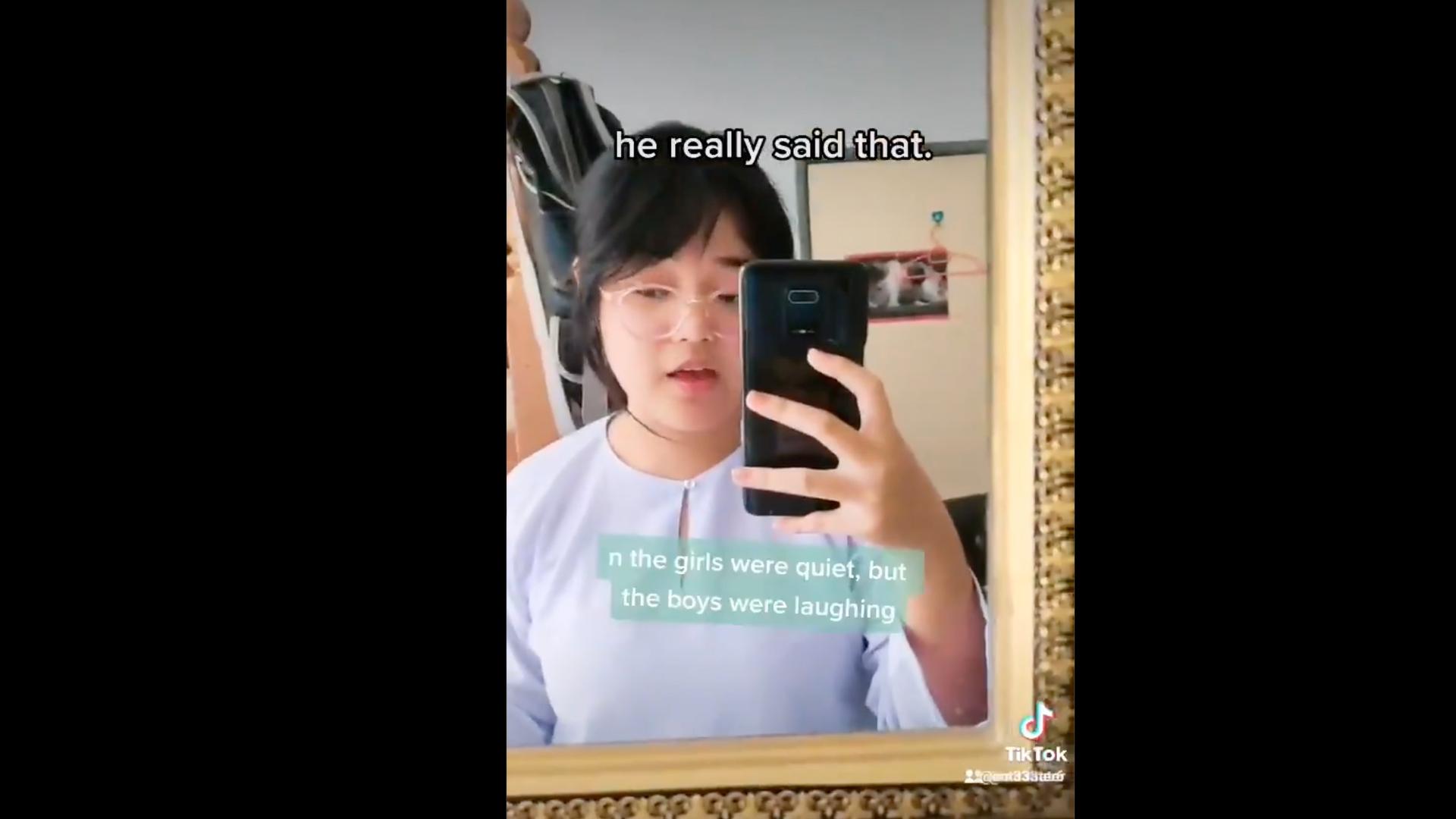Over a month ago, Ain Husniza, 17, posted a TikTok video calling out her male gym teacher for making an inappropriate comment about rape during a class discussion about sex education at school in Malaysia.
But since then, the teen said there’s been little movement to address the issue raised in the video that went viral. Husniza hoped to use social media to take on what she and other women’s rights activists call a toxic culture of sexual harassment and misogyny.
At the time, Husniza attended a public school outside of Malaysia’s capital, Kuala Lumpur.
Related: France’s 2nd #MeToo movement reckons with incest, child rape
In the one-minute video posted on April 23, she recalls the teacher joking that if someone wants to rape someone, they should make sure the victim is 18 years old. Husniza can be seen in the video cupping her hand over her mouth in shock.
“He really said that!” Husniza lamented, noting that after the comment was made, girls in the class were quiet while the boys laughed.
The video has since been viewed more than 1.9 million times, igniting a nationwide conversation about how women and girls are treated in schools across Malaysia — an ethnically diverse country of nearly 40 million people.
Related: Greece ‘finally’ has its #MeToo moment
The hashtag #MakeSchoolASaferPlace was born soon after, and it wasn’t long before other victims of school-based harassment and violence started telling their stories publicly online.
In May, Husniza’s movement even triggered one of the largest student protests in Malaysian history.
But when The World spoke earlier this week with Husniza, who lives outside of Kuala Lumpur, she sounded a bit deflated.
“Honestly, I feel really tired and I’m somewhat disappointed.”
“Honestly, I feel really tired and I’m somewhat disappointed,” Husniza said.
Since posting the video, she has been made to endure the same abuse that she was trying to shine a light on in the first place.
Husniza said that after posting the video on TikTok, she was bombarded with hateful messages from netizens, shamed for not wearing a headscarf on-camera and has even received rape threats from fellow students.
She also had to move schools when her former school wanted to expel her for not attending because she feared for her safety.
“Most of the schools are trying to protect the abusers rather than the victims. … I think that says a lot about the state of our schools right now.”
“Most of the schools are trying to protect the abusers rather than the victims,” Husniza said. “I think that says a lot about the state of our schools right now.”
Related: Mexican women are angry about rape, murder and government neglect
Meanwhile, there’s been no real action taken in the case Husniza and her family have filed against the gym teacher, nor the case they filed against a fellow student who threatened to rape her.
Gaayathrey Balakrishnan, with the Malaysia-based nongovernmental organization Women’s Aid Organization, said the reaction is “sadly and unfortunately” not surprising.
“In Malaysia the culture is still very much a patriarchal culture. Rape culture is extremely prevalent in Malaysia.”
“In Malaysia the culture is still very much a patriarchal culture. Rape culture is extremely prevalent in Malaysia,” Balakrishnan said.
“And whenever it comes to the situation of sexual violence or sexual abuse, a lot of people victim-shame and blame the survivors.”
Balakrishnan said this toxic culture toward women and girls is not new, nor is it specific to any type or level of school in Malaysia — where teachers are highly respected.
But the government and law enforcement agencies do not track statistics regarding abuse in schools, she said. It falls to NGOs like hers, but even then, she said, that data is often incomplete.
Balakrishnan said this leads people to believe there’s not a problem.
“The biggest thing that we need the government agencies to do is just to listen to the students,” Balakrishnan said. “You know, just something simple as them supporting Ain’s movement [on] a public platform.”
Still, Balakrishnan and other activists say this is a watershed moment for Malaysia.
For one thing, it’s given students an opportunity to speak out about these issues like never before, said Puteri Nuraaina Balqis, co-founder of Save The Schools Malaysia, an online platform inspired by Husniza, where people can share their stories about sexual harassment and violence experienced while at school.
“The stories came in from every single corner of the country. People everywhere are talking about it.”
“The stories came in from every single corner of the country. People everywhere are talking about it,” she said.
There are some 440 stories shared on the initiative’s Instagram account, and hundreds more in the pipeline, according to Nuraaina Balqis — stories about girls enduring verbal assaults, inappropriate gestures, groping and even period spot-checks by school administrators.
Husniza said despite the setbacks, she does not regret posting that first video to TikTok, or any subsequent videos addressing the harassment and misogyny allowed to run rampant through Malaysia’s schools.
And while Husniza is happy to offer up some recommendations — like better sex education and empowered ways for students to recognize sexual harrassment and assault, she also wants those in power to remember that she is only 17.
“I saw something is wrong here so you should — adults should — really think of the solution for how to make it better,” she said.
